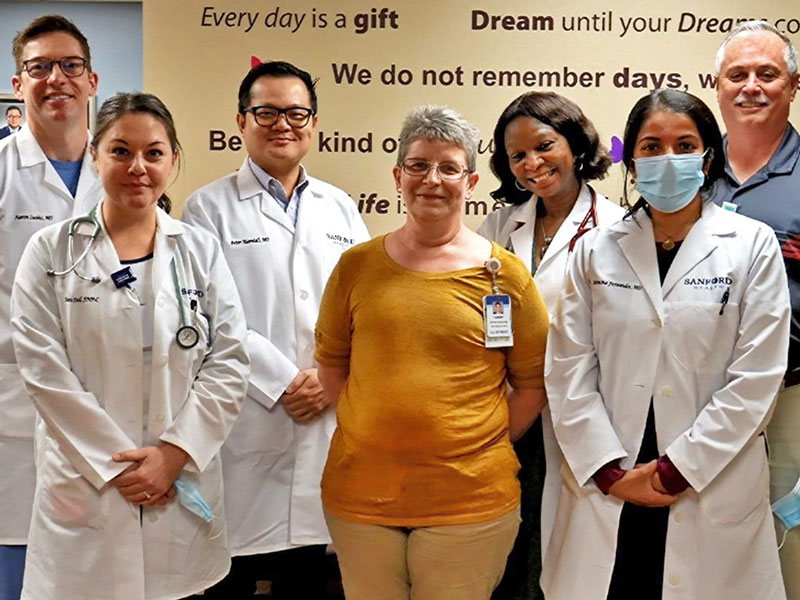Clinical Trials Day is celebrated globally on May 20 to recognize what many consider the first clinical trial. The year was 1747, and James Lind, a surgeon mate with Britain’s Royal Navy, was witnessing more shipmates dying of scurvy than of battle wounds.
On May 20, he initiated what he called a “fair test,” using 12 individuals to determine what treatments could provide a cure for scurvy. His work eventually eradicated scurvy from the British Navy following his recommendation to incorporate citrus fruit and lemon juice into the diet.
Today, clinical trials have become the cornerstone of bringing innovative new treatments to patients.
Clinical trials at Sanford Health
With over 250 active clinical trials, Sanford Health has placed particular emphasis on these trials to move patient care forward. Clinical Trials Day is an opportunity to honor the countless individuals within the organization who work hard to improve public health and also raise clinical trial awareness.
Clinical researchers use advanced technology and follow rigorous regulatory guidelines to investigate new therapeutic options, treat patients, and save lives. At Sanford Health, clinical research teams are conducting trials that cover a wide range of diseases.
Participation in clinical trials can provide patients with access to cutting-edge treatments while also improving the future of patient care.
See if you qualify: Search clinical trials at Sanford Health
As the senior director of clinical research, Lora Black shared the importance of clinical trials to Sanford Health’s vision to improve patient care.
“Sanford has been conducting clinical research in the community setting since the early 1980s,” she said. “Over the last three decades, ongoing physician leadership and organizational commitment to ensuring we can offer state-of-the-art treatment options to our patients — close to home — has been the driving force in our growth (in scope and depth).
“I am fortunate to lead a team of passionate, dedicated and innovative individuals who operationalize clinical trials on a day-to-day basis for the benefit of our patients.”
One of the clinicians who Black often works with is Jonathan Bleeker, M.D., a cancer and blood disorders specialist. Dr. Bleeker shared his insight on how clinical trials advance care for his patients.
“In the world of oncology, we see so many patients whose outcomes are not what we would want them to be, and one of the most exciting parts of our field is the ability to actively participate in clinical research to improve these outcomes,” he said.
“Clinical research allows us to both be a part of moving the field forward in a general sense, but even more specifically, it allows us to be able to provide cutting-edge treatments for our patients close to home, which is a huge benefit in terms of quality of life for our patients who are already going through a difficult time.”
Benefits to patients
Dr. Bleeker has observed firsthand how these trials have improved the lives of his patients.
“Over the past decade here at Sanford, we have participated in numerous trials that have demonstrated the effectiveness of new treatments that have gone on to be FDA approved based on those trials,” he said. “I have numerous patients in my practice who have directly benefited from being on those trials in terms of getting ‘tomorrow’s treatment today,’ and due to our ability to be a part of these trials, we have opened the door to these new treatment options for all of our patients and have helped to advance cancer care significantly over the past decade.”
He is thankful of the awareness that Clinical Trials Day brings to this essential facet of health care.
“Clinical Trials Day is a very small way to acknowledge everyone who needs to work together to make clinical trials work,” Dr. Bleeker said. “It takes an enormous team of nurses, regulatory staff, scientists and administrators to allow us to effectively run clinical trials and offer our patients these exciting treatment options.
“It is also a way to acknowledge the contributions of our patients who put their trust in us and agree to enroll on clinical trials. Without them, none of this work would be possible, and Clinical Trials Day is one small way to express our gratitude to them for their contributions as well.”
There are many ways to get involved in clinical trials, Black said.
“While you can browse options on the website, I encourage patients to visit with their physician to see what opportunities they have to participate,” she said. “Clinical trials are how we develop the next standard of care. In short, by being a clinical research volunteer, you are helping to shape the future of medicine for generations to come.”
Learn more
- How a clinical trial helps bring the latest in care to you
- Sanford cancer clinical trial shows improved outcomes
- Meet a family enrolled in type 1 diabetes study
…
Posted In Cancer, Cancer Treatments, People & Culture, Research
